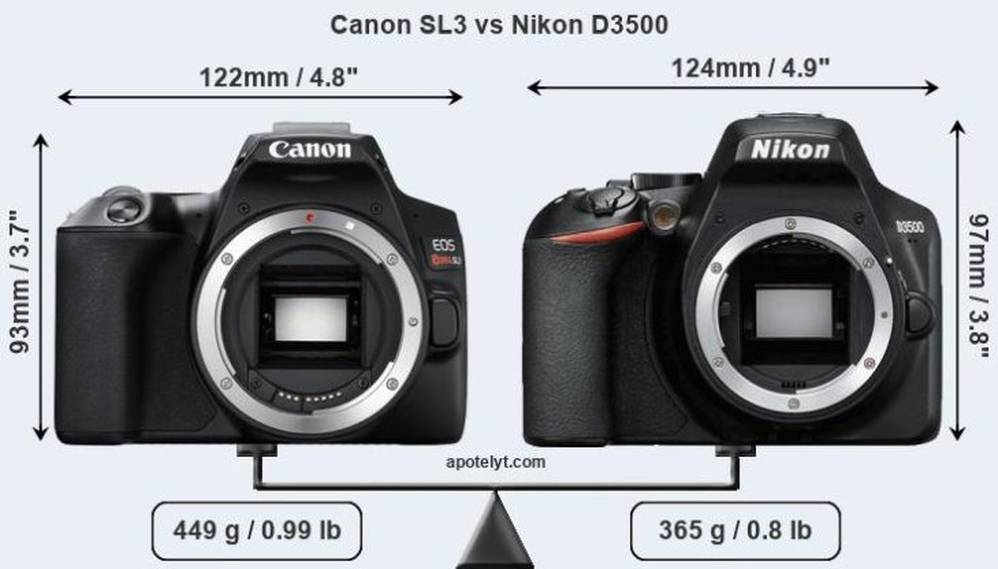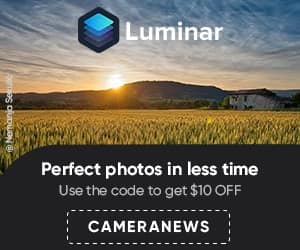Read our detailed comparison of the Canon EOS Rebel SL3 vs Nikon D3500 to find out their strengths and weaknesses.
Canon has introduced the EOS Rebel SL3 (EOS 250D) DSLR camera. The smallest and lightest entry-level DSLR uses the same 24MP APS-C CMOS sensor as its SL2 predecessor but adds a DIGIC 8 processor.
With Canon’s new Rebel EOS SL3 just hitting dealers’ shelves, we’ve compared it against one of its main competitors – the Nikon D3500.
| Canon EOS Rebel SL3 (EOS 250D) | Nikon D3500 | |
| Sensor and Camera Features | ||
| Brand | Canon | Nikon |
| Megapixels | 24.2 | 24.2 |
| Sensor Type | CMOS | CMOS |
| Sensor Format | APS-C | APS-C |
| SLR Type | Dslr | Dslr |
| Crop Factor | 1.6x | 1.5x |
| AA Filter | Fixed | None |
| Image Resolution | 6000 x 4000 (24.0 MP, 3:2) |
6000 x 4000 (24.0 MP, 3:2) |
| Body Image Stabilization | No | No |
| Native ISO | Min 100 – Max 25600 | Min 100 – Max 25600 |
| Full ISO Settings | Auto, 100 – 25600 in 1EV steps, Expandable to 51200 | Auto, 100 – 25600 |
| Startup Time | 0.4 seconds | |
| AF System and Shooting | ||
| Auto Focus Type | OVF: AF-dedicated CMOS phase-detect sensor, 9-points (Center AF point is cross-type at f/5.6, Center AF point is vertical line-sensitive at f/2.8); Live View: Dual-Pixel CMOS AF | OVF: Nikon Multi-CAM 1000 11-Area Phase Detection, 1 cross-type, 10 line-type; Contrast-detect AF in Live View mode |
| Continuous Shooting Speed / Burst Mode | Auto, 100 – 25600 in 1EV steps, Expandable to 51200 | Auto, 100 – 25600 |
| Shutter Speed Range | 1/4000 – 30 sec | 1/4000 – 30 sec |
| Bulb Mode | Yes | Yes |
| JPEG Buffer Size | Unlimited | 100 |
| AW Buffer Size | 10 | 13 |
| Screen/viewfinder | ||
| LCD | 3.0 | 3.0 |
| LCD Resolution | 1,040,000 dots (345,600 px) |
921,600 dots (307,200 px) |
| Touchscreen | Yes | No |
| Articulating Screen | Yes | No |
| Tilt Swivel Screen | Yes | No |
| Selfie Screen | Yes | No |
| Top Deck Display | No | No |
| Focus Peaking | No | No |
| Viewfinder | Optical / LCD | Optical / LCD |
| Viewfinder Type | SLR type; fixed eye-level pentamirror, ~95% coverage, ~0.87x mag., 19mm eyepoint, -3 to +1 diopter | SLR type; eye-level pentamirror, 95% coverage, 0.85x mag., 18mm eyepoint, -1.7 to +0.5 diopter, Type B BriteView Clear Matte Mark VII screen |
| Focus Peaking | No | No |
| Video Features | ||
| Video Resolution | 3840×2160 (24p/25p) | 1920×1080 (60p/50p/30p/25p/24p) |
| Video File Format | MPEG-4 AVC/H.264 video with AAC audio in MP4 container | MOV (Video: H.264/MPEG-4 AVC; Audio: Monaural Linear PCM) |
| Memory Card Type | SD / SDHC / SDXC | SD / SDHC / SDXC |
| Dual Card Slot | No | No |
| SD UHS Support | ||
| Microphone Jack | Yes | No |
| Headphone Jack | No | No |
| Flash and Internal Connections | ||
| Built-in Flash | Yes | Yes |
| Max Flash Sync Speed | 1/200 | 1/200 |
| Internal connections | Mini (Type-C) HDMI-CEC, 3.5mm Stereo Mic Jack, Wired Remote Jack | Type-C Mini HDMI with CEC, USB 2.0 |
| Connectivity | ||
| Built-In Wi-Fi | Yes | No |
| NFC | No | No |
| Bluetooth | Yes | Yes |
| Built-In GPS | No | No |
| USB Type | USB 2.0 High Speed,Bluetooth,WiFi | USB 2.0 High Speed,Bluetooth |
| Physical | ||
| Battery Life (CIPA) | 1070 shots | 1550 shots |
| Battery Types | Lithium-ion rechargeble | Lithium-ion rechargeable |
| Weight | 23.4 oz (664 g) includes batteries, kit lens |
21.7 oz (615 g) includes batteries, kit lens |
| Size | 4.8 x 3.6 x 2.7 in. (122 x 93 x 70 mm) |
4.9 x 3.8 x 2.7 in. (124 x 97 x 70 mm) |
| Price | ||
| Price | Buy from Amazon for $582.33 | Buy from Amazon for $396.95 |
| Release Date | 2019-04-10 | 2018-09-15 |
Canon EOS Rebel SL3 Advantages
- Better moiré control: Has an anti-alias filter to avoid artificial patterns to appear in images.
- Better video: Provides higher definition movie capture (4K/25p vs 1080/60p).
- Better video autofocus: Features on-sensor phase-detection for more confident movie autofocus.
- Better sound: Can connect to an external microphone for higher quality sound recording.
- More detailed LCD: Has a higher resolution rear screen (1040k vs 921k dots).
- More flexible LCD: Has swivel screen for odd-angle shots in portrait or landscape orientation.
- Fewer buttons to press: Is equipped with a touch-sensitive rear screen to facilitate handling.
- More selfie-friendly: Has an articulated screen that can be turned to be front-facing.
- Easier time-lapse photography: Has an intervalometer built-in for low frequency shooting.
- More modern: Is somewhat more recent (announced 7 months after the D3500).
Reasons to prefer the Nikon D3500:
- Maximized detail: Lacks an anti-alias filter to exploit the sensor’s full resolution potential.
- Larger viewfinder image: Features a viewfinder with a higher magnification (0.57x vs 0.54x).
- Less heavy: Has a lower weight (by 84g or 19 percent) and is thus easier to take along.
- Longer lasting: Gets more shots (1550 versus 1070) out of a single battery charge.
- More affordable: Was introduced into a lower priced category (28 percent cheaper at launch).
- More heavily discounted: Has been on the market for longer (launched in August 2018).
via Guidetocamera, ApoTelyt

